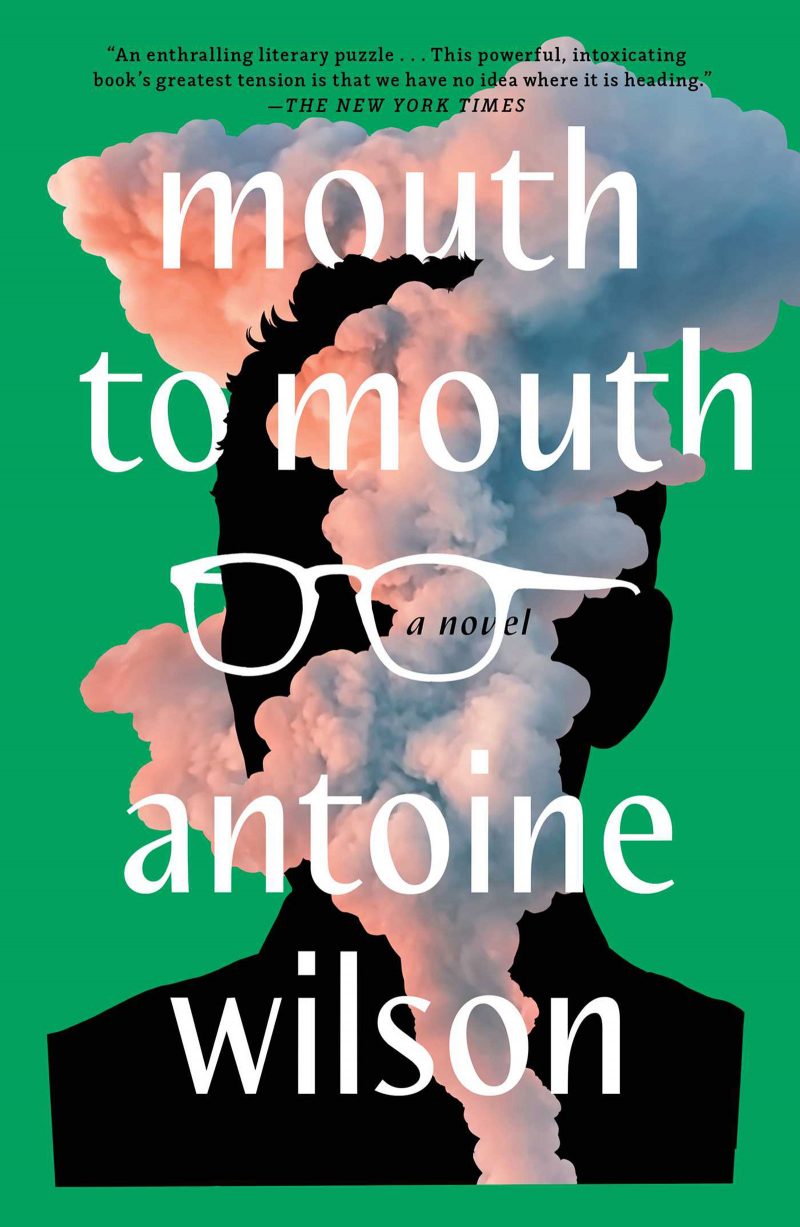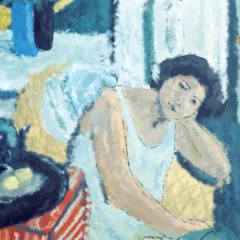
by Antoine Wilson. Published by Avid Reader Press/Simon & Schuster (January 11, 2022).
Mouth to Mouth, a new novel by Antoine Wilson was recommended to me as “suspenseful,” “gripping,” and “a lot about the art world.” Narrated by a nameless author, it tells the story of young adult Jeff and his mentor, renowned gallery owner Franics Arsenault. Artists especially will enjoy Mouth to Mouth, with its details like Jeff discovering the work of a young Joan Mitchell, and its depiction of art world corruption as a tenet and not a question.
The entire story occurs in an airport, and is told through one conversation. I recommend listening to the audiobook version, which is all the more immersive. Our narrator is a struggling author who, twenty years prior, attended UCLA at the same time as Jeff. Though “barely acquaintances,” the author describes Jeff as “one of those minor players from the past who claimed for himself an outsize role in my memories.” Jeff invites him as his guest to the first class lounge while they wait for the flight. The author is unused to first class treatment and, being eight years sober, drinks non-alcoholic beers (in pace with Jeff’s gluttonous alcohol consumption), establishing the author as Jeff’s foil.
The flight is delayed multiple times and eventually Jeff steers the conversation towards death and fate, a lead-in to his confession that after graduating college he saved a man’s life. His girlfriend had just broken up with him, and in a sort of heartbreak-induced fugue state, he found himself standing on a nearly-empty beach where a man happened to be drowning at sea. Already somewhat annoyed with the burden of saving the man and performing mouth-to-mouth resuscitation, Jeff is flummoxed when the man does not thank him- then, or in the days after. He later learns the man is Francis Arsenault, grows obsessed with him, and inserts himself into his world. Jeff waits for recognition from Francis that won’t come soon, but he’s unwilling to reveal himself as his savior. That would make him a “bad person” seeking reward, and he was a “good person” who did what anyone else would do in his position. Jeff and Francis’s dynamic reminds me of the HBO’s series Succession’s Logan and Kendall Roy, and not only because Francis – like Logan – is living on borrowed time due to his own hubris, but also the father-son dynamic.
I have met rich people like Francis, especially during my time working at a local cricket club. I can’t tell you how many times I, at 18 years old, stood next to tables where adults pretended not to see me– sometimes even talking badly about me, while I waited to take their order. Francis will place Jeff as his savior only after he has risen the ranks as an employee at his gallery and is dating his daughter. But he will only hint at knowing as a way to intimidate and manipulate Jeff- the truth would make his high rank at the gallery seem undeserved; a secret this large would ruin his relationship with Francis’s daughter. This, too, reminded me of Succession; when Logan kept secret Kendall’s involvement in a waiter’s death in exchange for his loyalty and as ammo in their battle for the “throne.”
The body is king in this novel. Ears: the nameless author lends them generously to Jeff, the catalyst for this story’s existence. Hair: Jeff crops his after saving Francis’s life, and this marks the start of his new life. It also contributes to Francis’s inability to recognize him. Eyes: Francis is known for his “eye”- not just his eye for art, but his one droopy eye, although journalists (likely out of fear) never mention the latter. Francis’s eye is also a physical omen signaling his ultimate demise. Heart: Jeff says Francis’s heart failure was to blame for both his near death experience and ultimate death.
The stickiest part in this story is when Francis describes a performance he saw in the past about the affect of the art world’s glass ceiling on Black men. The artist installs a ladder in the center of the room. It’s not supported by a wall, but instead plastered into the ceiling. He climbs up the ladder and bumps his head repeatedly until his head leaves an oil spot on the white ceiling.
Francis rejects the idea of a life lived climbing a ladder, and attributes his success to this belief. That he inherited a hefty art collection from his father is of no consequence; all that determines success, in his view, is having balls and using them. He even says, notably, that his “eye” is only famous because journalists don’t have the balls to print, “balls.” One of his many power trips of his toxic masculinity and ego-centrism includes dangling gallery representation before an MFA student in exchange for sex.
Before Jeff and the author’s flight finally departs, we learn that Jeff is now a successful art dealer himself. We also learn that the author is the only person who knows Jeff’s story. As if throwing him a bone to help his struggling career, Jeff implies that the author should write his story. But it is obvious to the author that this was Jeff’s motive all along. Francis would see, and Jeff does see, the nameless struggling author as stuck on a ladder. And this – in addition to his anonymity, and how for the majority of the novel he rarely speaks, except to react – makes him effective as a proxy for readers.
Jeff’s success story– as he unreliably tells it– is a capitalist narrative of rejecting fear and obstacles, a battle between his moral goodness and Francis’s bad influence, that earns him a wealthy and powerful life. But this won’t be how Mouth to Mouth ends. The author, obsessed with Jeff as Jeff is with Francis, will discover a critical lie in Jeff’s story which transforms the narrative from one of “pulling yourself up by your boot straps” into one of a Faustian bargain.
Mouth to Mouth by Antoine Wilson. Published by Avid Reader Press/Simon & Schuster (January 11, 2022). Simon & Schuster | Barnes & Noble









